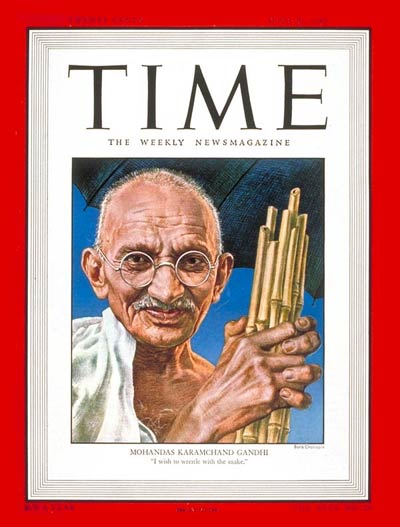Mohandas Gandhi
Mohandas Gandhi's legacy lives on all over the world today. In
(Pang, Sneha. Photograph. Pacific Palisades. Mahatma Gandhi World Peace Memorial. 14 Feb. 2009.)
Gandhi was one of the first to believe in the power of non-violence and truth, and put both in effect. His work has left its mark all over the globe.
Many other well-known revolutionists and leaders were known for following and spreading Gandhi's principles of non-violence and truth. Martin Luther King Jr. was a minister in the
("Gandhi: Pilgrim of Peace". Biography. History Channel. A & E Network, Manhattan. 2005. )
Although Gandhi's actions were legendary and his influence on today's world is positive, many find his beliefs controversial. When India was being split into a Hindu region and a Muslim region called Pakistan, Gandhi objected and was devastated when the event occurred. The Indian National Congress approved of the partition, and the Muslims accused Gandhi "for being unwilling to share power with Muslims" (Biography of Gandhi, 1). However, Gandhi himself stated that he would rather the Muslims and Hindus cooperated peacefully in India, and not have the country divided based on religious disputes. He "heatedly opposed the idea of a partition of India and did his best to bring all sides together" (Rosenberg, 4). Gandhi's loyalty to his religion has also been questioned and criticized many times. In fact, he was murdered by a man who thought Gandhi favored another religion over his own. Gandhi, a Hindu, always worked against racism and the inequality it brought. In South Africa, he fought for equal rights for Indians. In India, he attempted to bring Hindus and Muslims together. What his accusers didn't realize was that it was his opposition to racism that motivated him to create peace between Muslims and Hindus--not a biased favor of Muslims.
Tributes to Gandhi's great deeds add to his legacy today. Hundreds of books, articles, websites, and pamphlets were written on him. He was Time Magazine's Person of the Year in 1930, and in 1999, he was listed as their second most influential Person of the Century.

In 1982, the film, Gandhi, directed by Richard Attenborough and Govind Nihalani, was released and it won seven of its eleven nominations at the Academy Awards. Many films about Gandhi were released in Hindi as well-- Maine Gandhi Ko Nahin Mara in 2005, Lage Raho Munnabhai in 2006, and Gandhi My Father in 2007.
Gandhi's "teachings were as revolutionary as those of Jesus of Nazareth" (Asby, 371). His work became a benefit to everyone, no matter where they lived. He helped many people in the days he lived, and his accomplishments are still remembered today in many different shapes and forms.